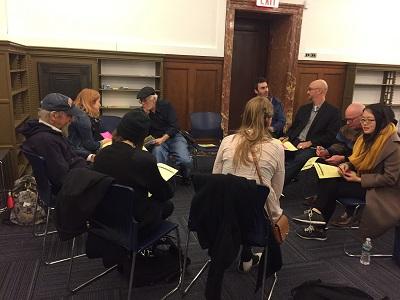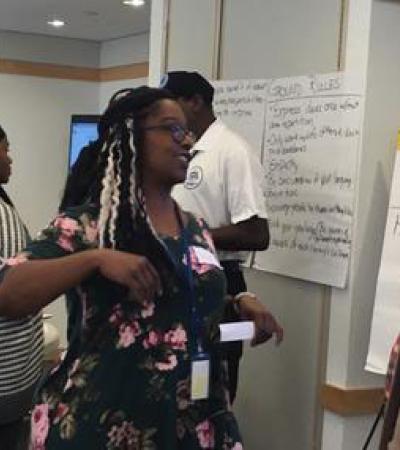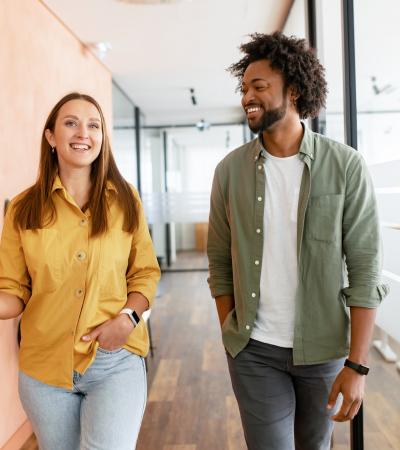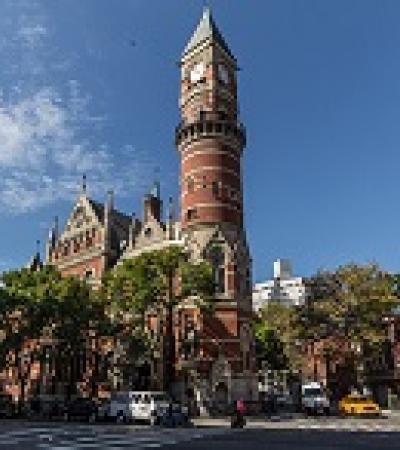The model for New York Public Library's Community Conversations series, as presented by Everyday Democracy and ALA’s Libraries Transforming Communities initiative, provides staff with valuable experience in community-mapping, partnership-building and the practice of facilitating public discussions.
From the pilot through our second series of themed conversations, Mid-Manhattan Library’s programming team noted the impact of the Community Conversations experience on the quality of our branch programming. As the largest and busiest circulating branch of The New York Public Library, Mid-Manhattan’s programming team is always on the lookout for sophisticated and robust opportunities to attract and engage the millions of New Yorkers and visitors that travel daily through midtown.
Here are a few Community Conversations initiatives that have stretched our staff to reach new audiences and deliver new experiences to our patrons — and what we learned along the way.

New York (City) State of Mind
At the start of our pilot series, Mid-Manhattan Library began a long-awaited and much-needed full renovation. The Everyday Democracy model recommends a 9-to-12-month planning and preparation period. However, determined to take advantage of the opportunity, we attempted to shape a program that catered to our current staff, space and resource capacity.
The initial conversation series was shaped around topics that appeal to our existing community of attendees. We created a pilot series of expert lectures with facilitated conversations with the theme New York (City) State of Mind. The subject focused around issues and situations impacting New Yorkers every day. Topics included Public Philosophy and Participatory Democracy, Literary Life in New York: Then and Now, and In Transit: Getting Around in New York City.
In designing and producing the program, there were many lessons to be learned. Flexibility, as a key component of any program that faces limited budget, time and staffing, is one major lesson. Others include the importance of finding a balance of academic versus everyday topics of interest; sharing a clear message about the format and intent of the program; and learning the best way to adapt the space into one that invites deep discussion.
More importantly, we recognized how staff strengthened their own skills through the Community Conversations training. The capacity of our staff to acknowledge and deal effectively with common, yet, challenging situations in public discussions increased with facilitation training.
Death Cafe and Immigrant Writing Workshop
Facilitation training not only builds confidence but provides tools to manage challenging discussions. In Death Cafe, a monthly discussion series to support and educate communities on issues surrounding death and dying, staff found facilitation tools helpful to defuse sensitive situations.
In the Immigrant Writing Workshop, a recurring series that invites those with migration experiences to write their stories, it is necessary to create a safe space for participants share points of vulnerability. From past experience, staff knew the tensions and harsh judgement or feedback they wished to avoid. Setting ground rules helped create a safe environment for the very diverse audience.

Caribbean Connections
Identifying appropriate programming partners is another valuable skill used to cultivate our programming. As often as possible, we actively seek outside organizations, experts and educators to support discussions, connect attendees to important resources and help spread the word and build an audience. Caribbean Connections, a program highlighting the history and culture of people of Caribbean descent, has successfully used this method to present a variety of film, music and arts programming. The CARNIVAL edition, in partnership with Local 1199 SEIU United Healthcare Workers East Social Cultural Committee, modeled York Caribbean Carnival costumes. An unexpected result was the participation of staff members, most of whom seldom attend library programs.
The tools and skills provided through the trainings increased the confidence of library staff to lead public discussions more capably. This increased confidence proved particularly helpful when we were unable to schedule a speaker for a post-screening discussion during the ReelAbilities Film Festival, a showcase of award-winning international films, stories and artistic expression of people with disabilities.
Creating Our Future NYC
Most recently, Mid-Manhattan Library’s Community Conversations series has evolved into a visual dialogue. Revamped to include a Community Art Project & Dialogue, Creating Our Future NYC is a sustainable, multifaceted format that works for our organizational capacity.
In cooperation with the NYPL Picture Collection participants were invited to explore the collection and learn artistic techniques to help visualize their ideal future New York City. Topics for expert presentations came from the images that participants selected and their subject searches. Branch visitors were invited to join in the visual dialogue via a pop-up display featuring selected images from a Vision Board workshop.
This new format allows us to partner with internal departments and new organizations while highlighting our collections and is generally of interest to our patrons. We look forward to developing more programs that will allow us to build on the community we’ve created.
Looking forward
Moving forward, we will continue to apply the skills and experiences learned through the Community Conversations initiative as we redefine branch programming. Connecting patrons to popular, recurring programs that feature the arts and topical discussions with relevant partner organizations is a priority. Equally important is finding more ways to collaborate with other departments throughout the library system. Finally, we hope continuing to expand valuable facilitation trainings for staff will set Mid-Manhattan Library up for even greater success.
Moriba Jackson is a supervising librarian at Mid-Manhattan Library at 42nd Street of the New York Public Library.



